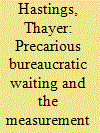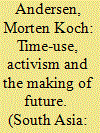| Srl | Item |
| 1 |
ID:
193010


|
|
|
|
|
| Summary/Abstract |
When Palestinian Jerusalemites refer to “the ministry” (al-dakhliya), they also refer to the sense of weightiness, lost time, frustration, exhaustion, and anxiety that accumulate to the Israeli Ministry of Interior located in the East Jerusalem neighborhood of Wadi al-Joz. Multiple pressures and limited access produce tedious and outright cruel conditions for Palestinians visiting the institution. This essay attends to the affective associations and meanings the institution represents to Palestinians in Jerusalem by drawing on the author’s own experiences there and while conducting ethnographic fieldwork, including conversations and interviews with interlocutors, journalistic reporting, fiction writing, and an examination of Google reviews of the ministry. It attempts to appreciate how the experience of delay at the ministry is configured as a tool of punishment within the context of ongoing Israeli settler colonialization.
|
|
|
|
|
|
|
|
|
|
|
|
|
|
|
|
| 2 |
ID:
170485


|
|
|
|
|
| Summary/Abstract |
The theoretical concepts of time and waiting have evolved mostly around the units of clocks and calendars. The Palestinians have been forced to let waiting be part of their national and cultural life. The forced displacement has scattered many Palestinians in exile around the globe. These Palestinians in diasporas have been waiting to return home one day and this perpetual state of waiting is one of the greatest tragedies of our time. The Palestinians' experience of time and waiting are quite different from most parts of the world. The linearity of time seems to break its rhythm when it enters Palestinian lives. The temporality appears to have multiple dimensions when it comes to Palestine. There are times when the clock is not the reference point of Palestinians' time, and hours and minutes can no longer gauge their waiting. They have given a new meaning to time, waiting and exile through not only the physical existence of their being, but also through their literature and art. Although we live in a culture that denigrates waiting, we have a whole Palestine hanging on for what can put an end to its wait. The concept of time, waiting and exile suddenly jumps out of the theoretical notions and embodies itself in Palestine. Palestinians' literature, movies and other art forms have encompassed these ideas to strengthen their collective memory and identity. The life of a dispossessed Palestinian has many internal contradictions that are at times not obvious but beyond the contradiction typically experienced by individuals in life. The Palestinian struggle for land is also a struggle against the established unitary idea of time and waiting of colonizers. This article will try to delve into such meanings of time and waiting for Palestinians in their cultural lives and their everyday existence.
|
|
|
|
|
|
|
|
|
|
|
|
|
|
|
|
| 3 |
ID:
145462


|
|
|
|
|
| Summary/Abstract |
The tendency of young men to join violent political organisations is a pertinent issue in the global arena of the social sciences and international policy, with studies of youth mobilisation and violence tending to focus on young marginalised men. This article proposes another view of political mobilisation, youths and violence that takes as its point of departure the centre of political power, namely the emerging elite in Bangladesh and young men engaged in youth politics at Dhaka University. Based on an analysis of mobilisation as processes of individual risk manoeuvring, relational aspirations and organisational incorporation, it argues time and time-use are productive analytical lenses to contextualise individual processes of involvement and bring out the agency of mobilisation.
|
|
|
|
|
|
|
|
|
|
|
|
|
|
|
|
| 4 |
ID:
173002


|
|
|
|
|
| Summary/Abstract |
This paper examines the duration of time in everyday life as depicted in Jia Zhangke’s 贾樟柯 second feature film, Platform 站台 (Zhantai) (2000). In light of the Bergsonian notion of time and Deleuze’s creative application of this notion in the realm of cinema, it demonstrates how the duration of time – the core of the experience of waiting depicted in the film – is brought out in the film’s narrative structure, cinematic devices, and acting style. Fundamental to the film’s creative endeavour is the attempt to capture the resistance of the present moment against the weight of its own virtual double, which is to say, to unearth the gaps and lacunae that lie beneath the temporal continuum assumed in our habitual way of living. On the basis of this particular vision of time, the film offers a critique of everyday life as the very site where the platitude of existing norms of culture is laid bare and where the unbearable pressure of time forces us to question the value of all existing possibilities.
|
|
|
|
|
|
|
|
|
|
|
|
|
|
|
|